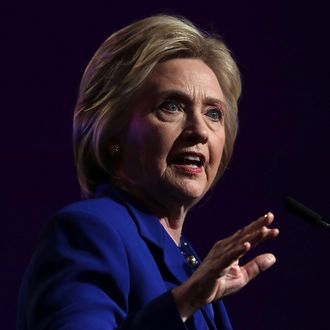
After the terrorist attack in San Bernardino last fall, Hillary Clinton refused to describe the shooting as an act of “radical Islam.”
“The problem is, that sounds like we are declaring war against a religion. That to me is number one, wrong,” Clinton said on ABC’s This Week. “It doesn’t do justice to the vast numbers of Muslims in our own country and around the world who are peaceful people.”
But on Monday, after Donald Trump called on the Democratic nominee to either say the words or drop out of the presidential race, Clinton chose to do the former. “I have clearly said many, many times we face terrorist enemies who use Islam to justify slaughtering innocent people. We have to stop them and we will. We have to defeat radical jihadist terrorism or radical Islamism, whatever you call it,” Clinton said on MSNBC’s Morning Joe.
Throughout the 2016 campaign, the Republican Party’s primary critique of Obama’s approach to the war on ISIS has been his refusal to characterize that conflict as a crusade against “radical Islamic terror.” While Clinton did not use that precise phrasing on Monday, her approximation was apparently close enough.
There’s reason to regret Clinton’s adoption of the right’s preferred rhetoric. As Politico notes, CIA director John Brennan once argued against describing “our enemy as as ‘jihadists’ or ‘Islamists’ because jihad is a holy struggle, a legitimate tenet of Islam, meaning to purify oneself or one’s community, and there is nothing holy or legitimate or Islamic about murdering innocent men, women, and children.”
But Clinton’s gesture should help clarify our domestic debate over counterterrorism policy. Republicans can no longer claim that Democrats refuse to “identify the enemy by name.” Now they’ll have to find another point of distinction. Which is to say, they’ll have to name the unique policy responses that follow from recognizing the “Islamic” character of the terror threat. As my colleague Jonathan Chait notes, Trump is one of the only Republicans to have answered this challenge, by proposing a blanket ban on all Muslims entering the United States. But virtually no one in his party’s leadership supports that ban. In fact, most have condemned it as antithetical to our values.
Perhaps support for a softer version of Trump’s proposal — a ban on all Muslim refugees — will become conservatives’ new criterion for being a “serious” opponent of terrorism. Or perhaps the GOP will line up behind its nominee’s broader ban, which enjoys overwhelming support from the party’s rank and file. Regardless, the distinction between how the two parties understand the threats we face should become clearer now that semantic disagreements have been pushed aside.






























